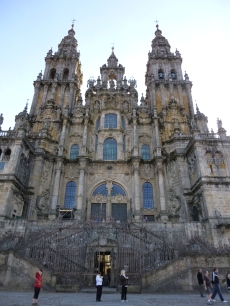In this segment I invite an inspirational reader to share a little of their life and a favourite recent read.
It is a complete accident that we have been born here and now, as we could just as easily have been Neolithic farmers or part of an Inuit hunter’s family. — Carol Knott

Grounded icebergs off Rode Ø (Red Island) in North-East Greenland. Photo: Robyn Mundy, 2016
Time travel
CK: I have always been fascinated by the idea of exploring time. Our lives are part of a continuum of past, present and future, bound together, for me, by a great sense of common humanity. It is a complete accident that we have been born here and now, as we could just as easily have been Neolithic farmers or part of an Inuit hunter’s family.

At Mousa Broch in the Shetland Isles, Carol recounts stories of feuds and forbidden love that played out within the walls of this formidable iron-age fortress. ©Robyn Mundy
One special site has inspired her to explore, first hand, the experience of women from the past; however, like all good character-driven stories, in embarking on one quest, Carol has found herself bounding along an entirely unanticipated trajectory:
Pilgrimage on horseback

© Carol Knott
CK: Sometimes a voyage takes me to Santiago de Compostella in Galicia, Spain, where we witness the arrival of dusty modern-day pilgrims, at the completion of their long Camino to this ancient shrine. It was a remarkable cultural phenomenon in the Middle Ages, and it is even more so today. Inspired by this, four of us, all women, resolved one day to do the Camino ourselves, but to try to do it on horseback, and from Lisbon — the Portuguese Way. We want to examine the experience of women travellers and pilgrims centuries ago, and compare it with our experience as modern women travelling today. I soon realised that my horse-riding skills were rusty in the extreme, so I started to do training rides wherever the opportunity arose.

Carol takes to the reins in Iceland. Icelandic horses, unique in having five natural gaits, are known for their sweet temperament, sure-footedness and ability to cross rough terrain — all fine qualities to aspire to! ©Elena Wimberger, 2016
With the months and miles of travelling Carol does each year for work, she spoke about her sense of home being vital to her life:
CK: I live on an island in the Outer Hebrides of Scotland, and I treasure the meaning that adds to my life—a place where the traditional Gaelic culture is strong and informs every aspect of modern life, where people over millennia have come to terms with the realities of living close to nature in what seems like a wild place. Wherever I go in the world, this strong bond to my family home provides me with an anchor that sets me free. This balance between freedom to wander and a deep sense of belonging is something I treasure greatly.
Carol’s favourite recent read:
 The Anchoress, by Robyn Cadwallader
The Anchoress, by Robyn Cadwallader
CK: I picked up this book as something to read on my way home from Antarctica, and chose it because it touched on my current interest in women’s freedom versus confinement, and also because the paperback was small and portable, ideal for a traveller like myself. But I loved the fact that this thoughtful book, set in thirteenth-century England, portrayed ideas that are so remote from our modern preoccupations. The central character, Sarah, at seventeen, enters a closed cell attached to a church, where she intends to spend the rest of her life as a holy woman in fasting and prayer. Here is a girl whose spiritual journey, and indeed almost all of the action of the book, takes place, not over miles of dusty roads, but within the silence of a cold, dark room only a few paces long. Robyn Cadwallader’s writing makes this appalling prospect sparkle with colour and drama, and takes us, body and soul, deep into the medieval world. It is another great example of how historical fiction can communicate difficult ideas vividly and effectively to a wide readership.

Wonderful post. I think I’ve said this before, but you get to meet the most interesting people, Robyn!
LikeLike
Thank you, Amanda. You are right there amongst them! R
LikeLiked by 1 person
As someone with a family and mortgage, I’m always a little envious of unencumbered lives in which people can experience the magnificence of all parts of the world. I love the opening quote, too! May Carol continue to experience soul-filling adventures and bring them to life for others as she does. Maybe one day, she could write them down for people to read!
PS. I loved the Anchoress, too—there aren’t a lot of medieval period books for adults that aren’t fantasy.
LikeLike
Thanks for this, Louise. I, too, hope Carol can be convinced to write something.
LikeLiked by 1 person